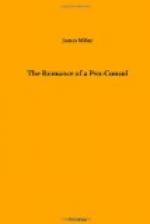It would have been curious if Sir George, a maker of British Parliaments, had not found his way to their cradle at Westminster. He had himself been a candidate for membership, but the House of Commons was only to know him as a visitor. ‘Why,’ he said, ’I met Adderley, now in the Lords, who once wanted to impeach me. Perhaps I deserved to be impeached—I don’t remember!—but anyhow we had a very agreeable chat about old days.’ Sir George, as a Privy Councillor, had been escorted to the steps of the throne in the House of Lords. There he met again the Marquis of Salisbury, who, as Lord Robert Cecil, had stood up for him, years and years before, in the Commons, even to the extent of criticising the English of Bulwer Lytton’s despatches. When he went to Australasia, to fortify his health and study the New World, he was the guest, for a period, of Sir George in New Zealand.
‘Some of his friends,’ said the latter, ’were great friends of mine; for example, Beresford Hope, who founded the “Saturday Review,” and Cook, who edited it. Lord Robert was tall and slight, and, when he came to New Zealand, not at all strong. While he was with me, he saw a good deal of the manner in which a Colony was conducted, and of the relationships between it and the Mother Country. He would read the despatches that I wrote and received, and generally made a study which may have proved useful to him in his subsequent career.
’As I recollect Lord Robert Cecil in New Zealand, he was not more fond of exercise than Lord Salisbury appears to be to-day, always being studious. He did not care to take long walks, but once I persuaded him, with another young Englishman, to go and see the beautiful Wairarapa Valley. They walked there and back, and on the last evening, while returning, were caught in a terrific rain-storm. They sought the shelter of some rocks, contrived to make a fire, and over it dried their shirts.’
Nothing afforded Sir George more genial occupation than a talk about books or politics, the latter always on the lofty ground to which, somehow, he could at once lift them. He had a knack of taking a question and shaking it on to your lap. You had it, as you never quite had it before, and to your fascinated ear the version seemed the only possible one. The secret was that Sir George laid hold of the kernel of a subject, and worked outwards—an expositor, not a controversialist. When evening waned he would turn to Epictetus, and then to a well-thumbed New Testament. It was the hour of meditation.
‘I have studied the New Testament in various languages,’ he said, ’thus getting more insight of it than I could have got through a single language. Never, during my early exploring work, was I without my New Testament to comfort and sustain me. The Sermon on the Mount is the great charter of mankind, its teachings the highest wisdom for all times and all climes. It and other pieces, which I might select, are of exceeding beauty and full of guidance and counsel. They inculcate in the human heart a love of one’s fellows, irrespective of colour.’




